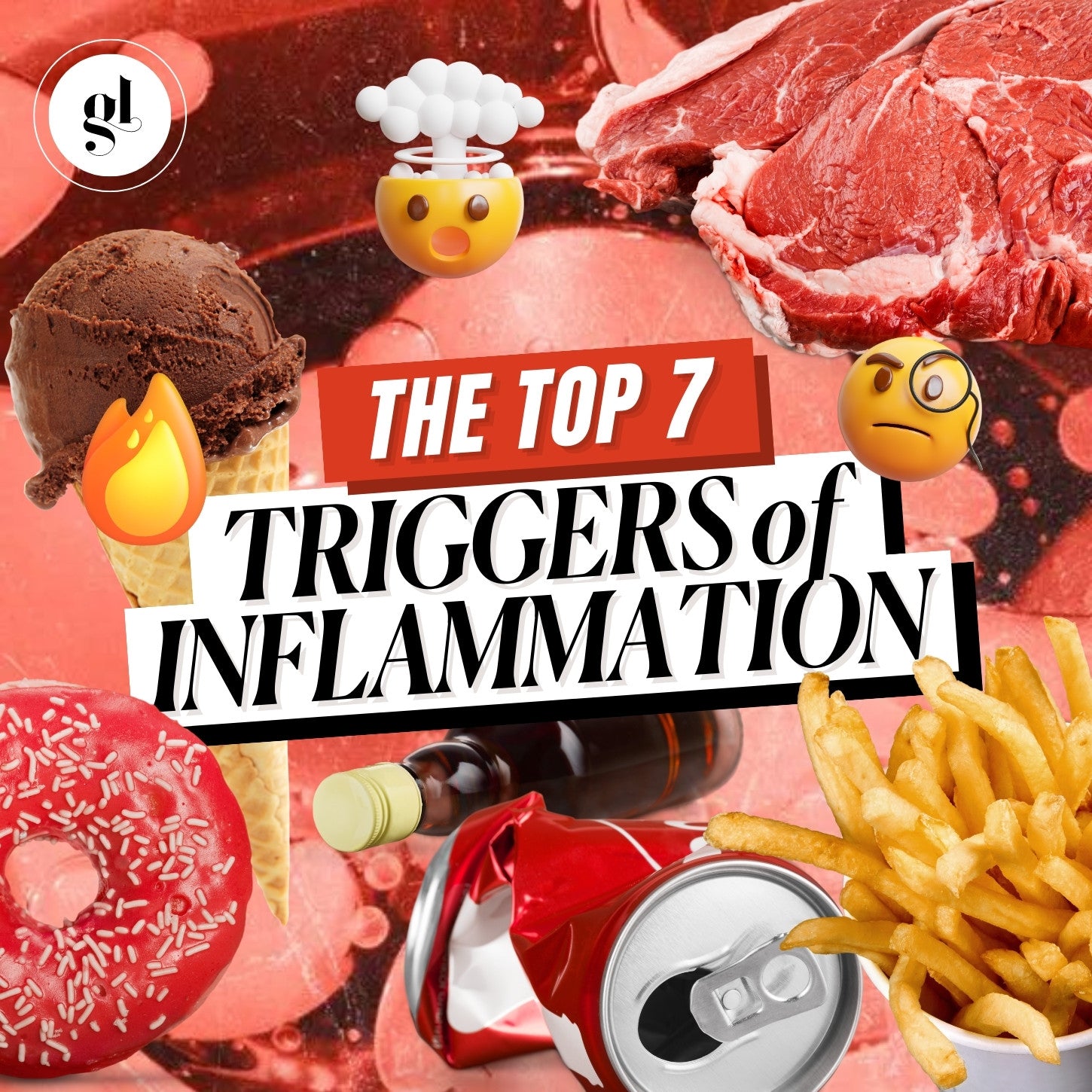Many people assume that staying away from gluten is a healthy choice, even for those who don’t have celiac disease.
In fact, a recent study that surveyed 3,000 people discovered that 20% had followed a gluten free diet, even though they had not been diagnosed with celiac disease or gluten sensitivity.
So, is it a good idea for everyone to eliminate gluten? Or can it be a healthy component of an anti-inflammatory diet?
What does the science say?
Table Of Contents:
What is gluten?
Gluten is the term given for a group of proteins called prolamins found in wheat and wheat-grains (including spelt, emmer, durum, farro, semolina, farina, khorasan, graham, and einkorn), barley, rye, and triticale.
Oats is another grain to look out for. While it may not naturally contain gluten, as a result of cross-contamination that can happen during growth and processing, many commercial oat products are unwitting carriers of gluten. Fortunately, certified gluten-free options are more widely available now and you can even find them in your local supermarket.
The two primary gluten proteins are glutenin and gliadin. Gluten is a powerful protein that acts as a binder, helping foods retain their shape and structure.

Who should avoid gluten?
It’s without doubt that some people should avoid gluten, such as those with celiac disease or a gluten intolerance.
-
Celiac disease
Celiac disease is a chronic intestinal inflammatory disorder caused by an intolerance to gluten, and is autoimmune in nature. It is not a rare disorder as once thought, with about 1% of the global population having celiac disease.
It is characterized by gastrointestinal symptoms of varying severity, ranging from mild discomfort to serious malabsorption. Celiac disease involves damage to the mucosa of the small intestine and deterioration of the microvilli. Microvilli are finger-like projections that line the mucosal walls.
People with celiac disease remain sensitive to gluten throughout their life, so strict, lifelong adherence to a gluten-free diet is a must.
By removing the cause of the disease, a gluten-free diet allows the gut lining to heal and symptoms to resolve. Even small amounts of gluten can cause harm. In fact, studies have revealed that ingesting gluten can elevate your gluten antibodies for up to three months. Therefore, even having one small cracker every 3 months could mean that your body is in a state of chronic inflammation year-round!
-
Gluten sensitivity
But it isn’t only people with celiac who should watch out for gluten. 0.5 to 13% of people may also have what is called non-celiac gluten sensitivity, a less severe form of gluten intolerance than celiac disease but one that can still cause symptoms. These are people who develop the classical symptoms of celiac disease after eating gluten but have normal small intestine biopsies and negative antibody tests.
The exact cause of non-celiac gluten sensitivity remains unknown.
Recently, researchers are finally homing in on markers for gluten sensitivity in the body. A study suggests that gluten-sensitive individuals may harbor high levels of a molecule called zonulin. Zonulin is an inflammatory protein that helps regulate leakiness (or permeability) in the gut by opening and closing the spaces or "junctions" between cells in the lining of the digestive tract. Lab tests that measure zonulin levels could help differentiate people with gluten sensitivity from those with irritable bowel syndrome.
You might have gluten sensitivity if you have persistent complaints (digestive and/or non-digestive) that usually get worse after eating gluten-rich foods but test normal for celiac disease or wheat allergies.

-
Some people with autoimmunity and other disorders
There are also some people with autoimmune issues who may do better to avoid gluten.
An 2019 study tested 34 women with autoimmune thyroiditis, examining the effects of a gluten-free diet over six months. After comparing levels of antibodies and other metrics before and after the dietary change, results indicated that cutting out gluten had beneficial impacts for those suffering from this condition.
While many parents anecdotally report that a gluten-free diet can lead to improved behavioral and social functioning in their children with autism spectrum disorder, scientific evidence on the subject is inconclusive.
A 2018 review of randomized controlled studies failed to demonstrate significant marked improvements—calling into question whether these reports are indeed meaningful or simply caused by a placebo effect. Further research needs to be done before any definitive conclusions can be drawn regarding this potential treatment option.
Recent studies have suggested that eliminating gluten from the diet may also offer therapeutic benefits for people who suffer from inflammatory conditions such as IBS, fibromyalgia and endometriosis.
What are some other drawbacks of eating gluten?
Many gluten-containing products contain concerning amounts of glyphosate.
Glyphosate, the primary active ingredient in Monsanto's (now Bayer) Roundup herbicide, is an alarming health risk as it has it been identified as a potential carcinogen and endocrine disruptor.
Its primary use is to eliminate weeds in GMO crops, but it has also found an additional use as a desiccant - providing farmers with the capacity to dry out their wheat and oat harvests prior to collection. However, choosing organic grain products can help to eliminate this problem.
Should everyone avoid gluten?
But for everyone else- for the majority of the population who don't have celiac disease, non-celiac gluten sensitivity and certain autoimmune and inflammatory conditions- there is no scientific evidence that removing gluten from the diet is needed for good health.
Indeed, a study found that a month-long gluten-free diet may cause disruption to the gut microbiome and weaken immune function, leaving those on such a diet vulnerable to dangerous bacterial overgrowth.
We should also keep in mind that nobody eats gluten in isolation. Some people who think they are sensitive to gluten could actually be reacting to other food ingredients, particularly poorly absorbed carbohydrates present in wheat and many other foods, such as the FODMAPs.
Carbs in wheat called fructans can account for as much as half of a person's FODMAP intake. These compounds ferment in the gut and cause symptoms of irritable bowel syndrome, such as abdominal pain, bloating, and gas, which can be misinterpreted as gluten intolerance. If this is the case, then millions of people may be following a gluten-free diet with no good reason.
Despite being one of the biggest health trends of the past decade, a gluten-free diet is not necessarily a healthy diet. Gluten-free products are usually less available and up to three times more costly.
In addition, a review of 21 studies found that persons following a gluten-free diet often fall short on important vitamins and minerals, especially vitamin B12, vitamin D, iron, folate, calcium, magnesium, and zinc. This is thought to be secondary to the restrictive nature of the diet as well as the chemical alterations of gluten-free products.
The risk is even greater when gluten-containing foods such as whole grain bread are swapped for highly processed gluten-free alternatives. This is because gluten-free processed foods usually have lower amounts of fiber, vitamins, and minerals as well as a higher glycemic index.
The culprit may not be gluten itself but rather what we often accompany it with—unhealthy junk food high in refined sugar and food additives and chemicals. With this in mind, swapping out processed cakes, pizzas, and donuts for nutrient-rich fruits and veggies could lead to a newfound sense of vitality!
The benefits of eating whole wheat products
Going gluten-free also means you’d be missing out on all the health benefits that whole grains offer.
Whole grains are an important food category in our diet and represent an invaluable source of carbohydrates, proteins, fibers, phytochemicals, minerals, and vitamins. Many studies have shown that the consumption of whole grains reduces the risk of cancer, cardiovascular diseases, type 2 diabetes, and other chronic diseases. However, although grains provide numerous health benefits, these advantages seem to be lost when consumed in their refined form.
Whole grain foods – including the gluten-containing grains wheat, barley, and rye – are health-promoting and cardioprotective. Consuming whole grains significantly lowers the risk of coronary heart disease in both men and women. In addition, eating whole wheat, oat-based breakfast cereal, oatmeal, and oat bran can reduce blood pressure and cholesterol levels.
With regards to type 2 diabetes, eating whole grains has many benefits. Eating at least two servings of whole grains daily may help reduce the risk of type 2 diabetes by 21%.
This is because fiber, nutrients, and phytochemicals in whole grains may improve insulin sensitivity and glucose metabolism. For people who already have diabetes, eating more whole grains has the potential to improve glucose control and help maintain adequate body weight, lipid levels and control other risk factors for cardiovascular disease.

The Verdict on Gluten
So, after hearing all the evidence, what does the jury conclude?
If you have celiac disease, gluten is to be avoided at all costs. If you have a gluten sensitivity, it is best to avoid gluten, and if you have an autoimmune or inflammatory disease, see if your symptoms improve on a gluten-free diet.
But if none of these apply to you, then avoiding gluten means you are going to be missing out on all the health benefits organic, gluten-containing whole grains have to offer.
It's easy to be confused by the conflicting advice and studies about dietary health. However, it can be helpful to remember that your body is unique - meaning any 'one-size-fits-all' approach may not work for you specifically.
If something like gluten seems suspiciously impactful on your wellbeing, why not test it out directly? Conducting a self-experiment of going off and then reincorporating gluten into your diet will allow you to evaluate what works best for your individual needs in terms of fueling and feeling great!
Recipe Spotlight: Japanese Soba Noodle soup
This Japanese Soba Noodle Soup is fresh, appetizing and extremely nutritious. It’s also versatile as you can customize your meal with the vegetables you have at home.
Soba noodles are made from buckwheat and are therefore naturally gluten-free.
They’re high in protein and fiber, making a meal that leaves you satisfied and full of energy for the rest of the day. Enjoy!
















What Do You Think? Comment Below: